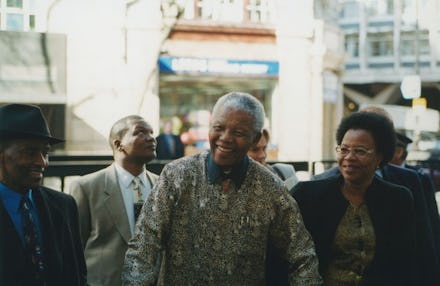If Nelson Mandela Was a "Terrorist" As Some Claim, Then So Was George Washington

Back in the 1980s, Ronald Reagan, Dick Cheney, and other paladins of the American right labeled Nelson Mandela a terrorist.
While mainstream conservatives tend to renounce this characterization today, it still has currency in more ideologically zealous circles. Indeed, some people on Twitter are already tweeting away reiterations of the infamous "terrorist" designation. To be sure, much of this incendiary rhetoric is driven by the most craven kind of attention-seeking. At the same time, there is always the risk that some might be persuaded by this venomous misinformation.
The first (and by far most important) point is this: Mandela's priority was ending Apartheid. As biographies have repeatedly made clear, he strongly preferred non-violent methods to violent ones, and abhorred the notion of resorting to physical force. At the same time, he did not subscribe to the philosophy of civil disobedience preached by Henry David Thoreau, Mahatma Gandhi, and Martin Luther King. He was a freedom fighter, not a protester, and revolutionaries fighting against tyranny often don't have the luxury of avoiding violence. Mandela acknowledged this himself when he said, "Non-violence is a good policy when conditions permit," but perhaps a more apt quote can be culled from one of America's greatest founding fathers, Thomas Jefferson:
"The tree of liberty must be refreshed from time to time with the blood of patriots and tyrants."
Unless you're a pacifist, it is necessary to concede that if injustice and oppression reach extremes that cannot be thwarted non-violently, the evil of violent resistance is far less than the evil of continued acquiescence to wrong. And unless one is a racist (or at best historically ignorant), then it must be acknowledged that South Africa's apartheid regime was one of the most unjust, oppressive, and morally repugnant governments to ever exist.
Under apartheid, different races were forcibly separated by law. If you were black, you had to carry special papers wherever you went, lacked the right to vote, were barred from any job that might allow meaningful, socioeconomic advancement, and were subject to casual violence, squalid living conditions, and regular humiliation from both the oppressive state and the bigotry of ordinary citizens.
When Mandela joined the African National Congress (ANC) in the 1940s, he did so because the organization was dedicated to ending apartheid oppression. After the ANC was banned in 1960, and nonviolent attempts to work within the framework of existing South African political institutions became impossible, Mandela advocated establishing a military wing with the ANC. Although the ANC did not officially endorse Mandela's proposal, it agreed to not interfere with those members who chose to do so, prompting Mandela to form the Umkhonto we Sizwe. This ultimately led to his arrest in 1962, which initially resulted in a sentence of five years' hard labor before an alleged plot by other members of Umkhonto we Sizwe to overthrow the government caused him to be sentenced to life imprisonment. He spent the next 28 years behind bars, inspiring the anti-apartheid movement with his unyielding refusal to accept anything other than complete freedom for his people.
This is not the biography of a pacifist, and while Mandela himself never claimed to have consistently practiced and preached nonviolence in his own life, others who dub him as "pacifistic" do so erroneously. It is quite wrong, however, to claim that he wasn't a hero. After all, America exists because men like Benjamin Franklin insisted, "Even peace may be purchased at too high a price."
We rightly adore statesmen who led both our land and others through some of history's bloodiest wars in the name of gaining and/or protecting freedom, from our own George Washington and Ulysses S. Grant to Winston Churchill and William Wallace on the other side of the Atlantic.
If those men are to be honored, then it is unfathomable for Mandela to be denounced as a terrorist.